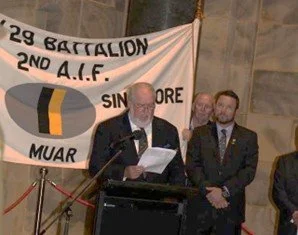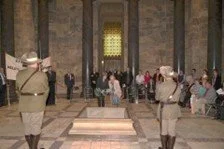2015 Battle of Muar Commemoration Service
More than 65 members, friends and family attended the annual Battle of Muar Commemoration at the Shrine of Remembrance, which was held on Sunday 18th January. Simon Lovett, Honorary Secretary, emceed the event, which was this year conducted in the Shrine Sanctuary. The address on the significance of the occasion was delivered by John Lack and the wreath was laid by Berris Christie (widow of our Patron Robert ‘Bob’ Christie) and his daughter, Janella. Morning tea followed in the Western Gallery.
I would like to thank all committee members for their input and assistance to make this service so memorable.
Joy Derham, Treasurer
Address by John Lack
The 2/29th Battalion AIF first went into action on 17 January 1942, just north of the Bakri crossroads in Johore, Malaya. Ever since, on the Sunday falling on or immediately following the 17th of January, the Battalion and its Association have commemorated the Battle of Muar, and honoured its war dead of Muar. This is the 73rd of those services.
The men were in Changi for the first anniversary of Muar, which fell on Sunday 17 January 1943. The Battalion was justifiably proud of its stand at Muar – just four companies of the unit’s five – against overwhelming numbers of the enemy. But the losses had been terrible, the number of fallen comrades grievous.
Some 160 men had died in the six days 17-22 January – more than half of them presumed dead, because there was no clear evidence of their fate – but almost 60 per cent of the Battalion had been casualties. So many hundreds had been wounded that the Battalion required some 500 reinforcements on Singapore Island.
We should also understand that in the year after Muar men of the Battalion had continued to die in Changi from wounds suffered at the battle of Muar, and at Bakri with Colonel Anderson’s column.
Colonel Pond’s diary tells us that at 4.15 on the afternoon of Sunday 17 January 1943, Padres Polain and Walsh led a very good service. Bob Christie recorded that Col Pond gave a reading, Major Hore read the lists of the fallen, and Padre Polain gave the address: ‘2 wreathes were placed one for Lt. Col. Robertson and the other for the men who fell. Pilgrimages were also made to the Shrine or cemetery.’
The next year, on Sunday 23 January 1944, there was a morning church parade and in the afternoon some 100 men of F Force (who had just returned from working on the railway in Thailand) made a cemetery pilgrimage. Bob noted that Col Pond spoke, silence was observed, and there was a ‘Pilgrimage made to [the] shrine.’
In 1945, as the beginning of the fourth year of captivity approached, Sunday 21 January saw (Colonel Pond noted) ‘a good attendance’ at an evening anniversary service for Muar.
We continue a tradition that has been conducted solemnly for 73 years. Since the end of the war, beginning in January 1946, the Battalion Association has held its annual service of commemoration here at the Shrine. Today’s service is the 70th of those Shrine services.
This year, as well as marking the centenary of the start of the Great War and of the Gallipoli campaign, is the 70th anniversary of the end of the 1939-45 War.
So it is fitting, perhaps, to return today to the readings Colonel Pond gave at that service in 1945, when the men of the Battalion were anxiously awaiting – eagerly anticipating – the end of the war:
Col Pond read a passage from the Bible and a war poem.
Ecclesiasticus Chapter 44 verses 1–15 begins ‘Let us now praise famous men, and our fathers that begat us.’ and ends as follows:
‘9 And some there be, which have no memorial; who are perished, as though they had never been; and are become as though they had never been born; and their children after them.
‘10 But these were merciful men, whose righteousness hath not been forgotten.
‘11 With their seed shall continually remain a good inheritance, and their children are within the covenant.
‘12 Their seed standeth fast, and their children for their sakes.
‘13 Their seed shall remain for ever, and their glory shall not be blotted out.
‘14 Their bodies are buried in peace; but their name liveth for evermore.
‘15 The people will tell of their wisdom, and the congregation will shew forth their praise.’
He followed this with The Dead, one of five sonnets that Rupert Brooke* had published in the autumn after the outbreak of the Great War in August 1914:
III: The Dead
Blow out, you bugles, over the rich Dead!
There’s none of these so lonely and poor of old,
But, dying, has made us rarer gifts than gold.
These laid the world away; poured out the red
Sweet wine of youth; gave up the years to be
Of work and joy, and that unhoped serene,
That men call age; and those who would have been,
Their sons, they gave, their immortality.
Blow, bugles, blow! They brought us, for our dearth,
Holiness, lacked so long, and Love, and Pain.
Honour has come back, as a king, to earth,
And paid his subjects with a royal wage;
And Nobleness walks in our ways again;
And we have come into our heritage.



